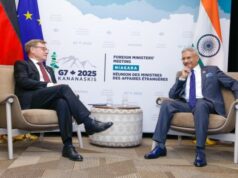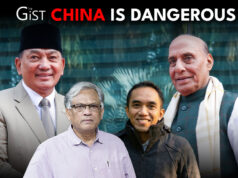In Japan, over 200 military and civil defence personnel were disciplined on Friday including the military’s top brass and senior bureaucrats, for mishandling classified material and other incidents.
The information security problems have occurred as Japan seeks closer cooperation with the U.S. and other western democracies, including in intelligence sharing, to coordinate responses to Russia’s invasion of Ukraine and rising tensions with China. Doubts about Japan’s ability to handle classified information could hinder that collaboration.
The head of Japan’s Maritime Self Defense Force, Ryo Sakai, resigned his post on Friday, effective on July 19, after reports that sailors without security clearance were allowed to access sensitive vessel tracking data of foreign military ships.
Sakai’s commander, General Yoshihide Yoshida, the Chief of Staff of Japan’s Joint Staff, along with the commanders of the other military branches were also reprimanded, but will remain in their posts, Japan’s Minister of Defense Minoru Kihara said at a news conference. Kihara apologized for the security lapses and other infractions, including fraudulent compensation claims by SDF personnel for diving assignments.
Kihara and Minister of Foreign Affairs Yoko Kamikawa are expected to push for closer cooperation with Washington later this month when they meet their U.S. counterparts for security talks.
“We will take radical action to strengthen information security,” Kihara said when asked whether the lapses would hurt cooperation.
To align with other western countries, Japan in May passed a new security law to tighten rules on classified information handling and security vetting. It also plans legislation to allow the SDF to actively hunt out cyber security threats that could harm critical infrastructure or sensitive data.
“I recognize that the situation is extremely severe, and in that context, I understand there is no room for error,” Prime Minister Fumio Kishida said in addressing the information security incidents in Washington D.C. earlier on Thursday where he joined a North Atlantic Treaty Organization (NATO) leaders meeting.
The fraudulent compensation claims and other alleged incidents including allegations that SDF personnel failed to pay for meals are also an embarrassment for Kishida at home as he looks to bolster the military.
In 2022 he unveiled a plan to double defence spending to 2% of GDP to pay for missiles and other weapons meant to deter China from resorting to military action in East Asia.
Thirty eight years in journalism, widely travelled, history buff with a preference for Old Monk Rum. Current interest/focus spans China, Technology and Trade. Recent reads: Steven Colls Directorate S and Alexander Frater's Chasing the Monsoon. Netflix/Prime video junkie. Loves animal videos on Facebook. Reluctant tweeter.




